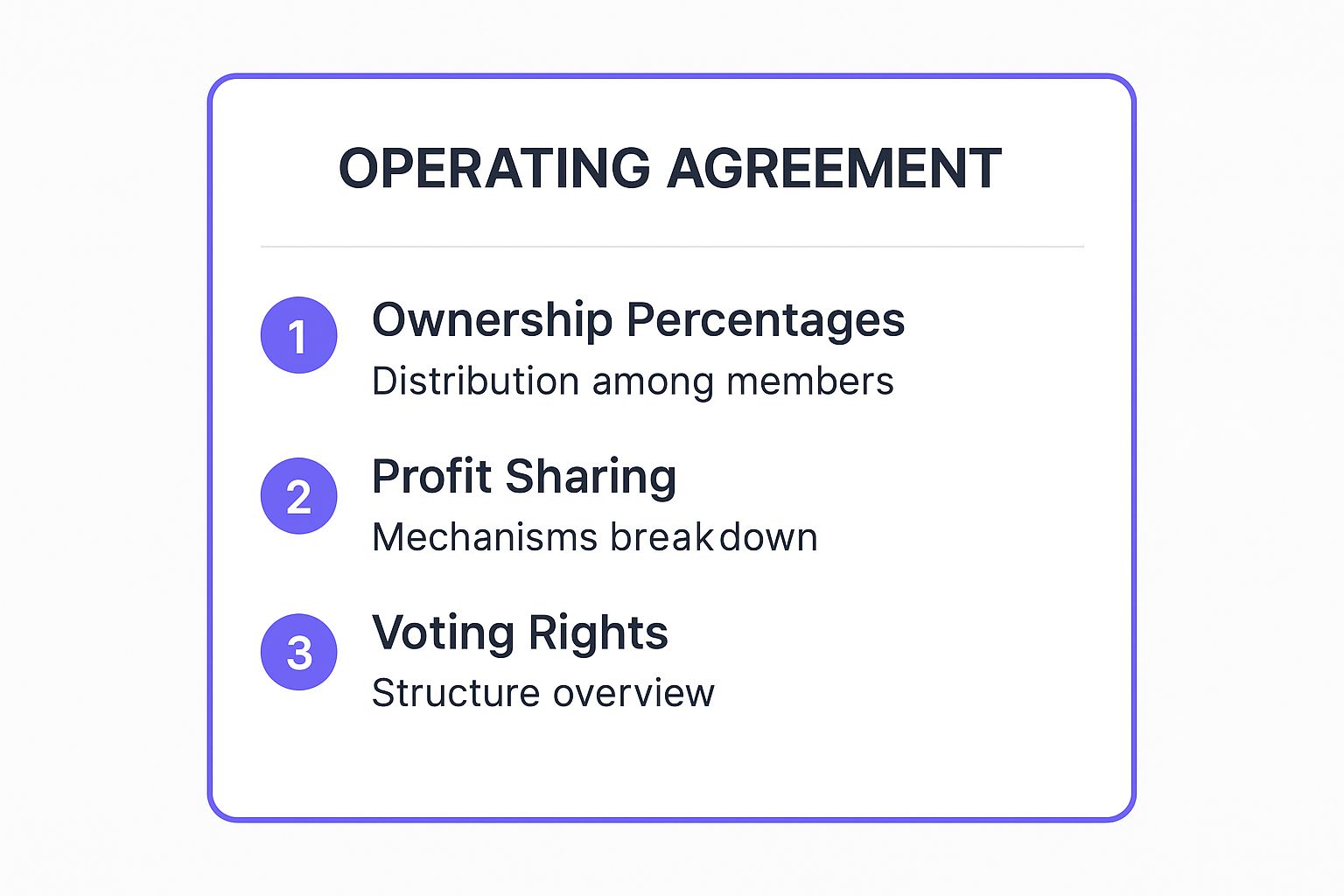
Launching a startup is a whirlwind of innovation, fundraising, and growth hacking. But beneath the exciting surface, a solid legal foundation is the bedrock that prevents the entire structure from collapsing. Neglecting key legal paperwork is a common, and often fatal, mistake. It can lead to founder disputes, intellectual property loss, and regulatory penalties that stop a promising venture in its tracks.
This guide is designed to be your definitive checklist for building a legally sound and investor-ready company. We will walk you through the essential legal documents for startups, providing a clear roadmap to protect your business, secure investments, and prepare for long-term growth.
Instead of just listing documents, we will break down precisely why each one matters and provide actionable tips to get them right from day one. You will learn how to properly structure your business, protect your intellectual property, and define relationships with co-founders, employees, and customers. We will also explore how modern AI-driven tools can simplify the creation and management of these crucial agreements, making robust legal protection more accessible than ever. Consider this your go-to resource for securing your startup's future.
1. Articles of Incorporation
The Articles of Incorporation is the foundational legal document that formally establishes your startup as a corporation. Filed with a state government, this document acts as your company's birth certificate, creating a distinct legal entity separate from its founders. This separation is crucial, as it provides limited liability protection, shielding your personal assets from business debts and lawsuits.

This document outlines your corporation's basic structure, including its name, purpose, stock structure, and registered agent. It is one of the most essential legal documents for startups because, without it, your business has no legal corporate existence.
Why It's Essential for Startups
Think of tech giants like Google (1998) and Facebook (2004). Both chose to incorporate in Delaware early in their journeys, a strategic move that positioned them for massive growth and investment. The Articles of Incorporation made their ventures "real" in the eyes of the law, investors, and partners. This legal legitimacy is non-negotiable for any founder seeking to build a scalable, fundable company. It allows you to issue stock, enter into contracts, and raise capital under the corporate name.
Actionable Tips for Drafting
Creating effective Articles of Incorporation involves more than just filling out a form. Here are some pro tips:
- Consider Delaware Incorporation: Over 67% of Fortune 500 companies are incorporated in Delaware for a reason. Its business-friendly laws, specialized Court of Chancery, and predictable legal landscape make it the gold standard for startups seeking venture capital.
- Authorize Ample Stock: Authorize significantly more shares of stock than you plan to issue initially. This provides flexibility for future financing rounds, employee stock option plans, and acquisitions without needing to amend your articles later. A common number for a new startup is 10,000,000 authorized shares.
- Use a Broad Purpose Clause: Instead of narrowly defining your business, use a general purpose clause like, "to engage in any lawful act or activity for which corporations may be organized." This prevents you from being legally restricted if your business model pivots.
- Maintain Your Registered Agent: Your registered agent is your official point of contact for legal notices. Ensure their information is always current with the state to avoid missing critical communications, which could lead to default judgments or loss of good standing.
2. Operating Agreement (LLC)
While Articles of Incorporation create a corporation, an Operating Agreement is the critical internal document for a Limited Liability Company (LLC). It serves as a detailed rulebook that governs the LLC's financial and functional decisions, including the roles, responsibilities, and ownership stakes of its members. This agreement dictates how the business will be run, profits will be distributed, and conflicts will be resolved.
This agreement is one of the most vital legal documents for startups that choose the LLC structure. It provides operational clarity and helps prevent future disputes by setting expectations upfront. Without a well-drafted Operating Agreement, your LLC will be subject to the default rules of your state, which may not align with your business goals or the members' intentions.
Why It's Essential for Startups
The flexibility of an LLC is its greatest strength, and the Operating Agreement is what unlocks that potential. It allows founders to customize their management structure, profit distribution, and voting rights in a way that suits their specific needs. For instance, a professional services startup might use it to define clear performance-based compensation, while a family business can use it to establish succession plans. This document solidifies the limited liability protection of the LLC by demonstrating that the company is a separate, well-organized entity.
For a quick reference, the following infographic summarizes the core components typically defined in an Operating Agreement.

These three elements, ownership, profits, and voting, form the backbone of your company's internal governance and are crucial to define clearly.
Actionable Tips for Drafting
A comprehensive Operating Agreement can save you from significant legal and operational headaches down the line. Here are some key tips:
- Define Clear Roles and Responsibilities: Specifically outline the duties and authority of each member or manager. This clarity minimizes confusion and ensures accountability, preventing operational bottlenecks as the startup grows.
- Include Detailed Buy-Sell Provisions: Plan for the future by detailing what happens if a member wants to leave, passes away, or becomes disabled. These provisions should cover the valuation process and terms of the buyout, protecting both the departing member and the company's stability.
- Consider Tax Elections: An LLC can choose its tax classification. The Operating Agreement should reflect whether you will be taxed as a sole proprietorship, partnership, S-Corporation, or C-Corporation, as this impacts profit distribution and member tax obligations.
- Review and Update Regularly: Your business will evolve. Treat the Operating Agreement as a living document. Review it annually or after major events like bringing on a new member or securing significant funding to ensure it still reflects your business's reality.
3. Founders' Agreement
A Founders' Agreement is the prenuptial agreement for your business partnership. It is a critical contract between co-founders that formally outlines the ownership, roles, responsibilities, and liabilities of each member of the founding team. This document sets the ground rules for your relationship, creating a clear roadmap for how the business will operate and how potential disputes or founder departures will be handled.

It details everything from equity distribution and vesting schedules to intellectual property ownership and decision-making processes. As one of the most vital legal documents for startups, it aligns expectations from day one, preventing the kind of misunderstandings that can destroy a promising venture before it even gets off the ground.
Why It's Essential for Startups
Many famous startup stories are also cautionary tales of founder conflict. The infamous legal battles at Facebook, which involved disputes over equity and contributions, highlight the immense cost of not having a clear agreement in place. Conversely, the clear roles defined between Apple's Steve Jobs and Steve Wozniak allowed them to focus on their respective strengths. A strong Founders' Agreement forces you to have difficult but necessary conversations early, ensuring everyone is on the same page and committed for the long haul.
Actionable Tips for Drafting
A robust Founders' Agreement is your first line of defense against internal conflict. Use these tips to build a solid foundation:
- Implement a Vesting Schedule: Tie equity ownership to continued service over time, typically a four-year period with a one-year "cliff." This means if a founder leaves after six months, they walk away with nothing, protecting the company's equity for the remaining dedicated team.
- Define IP Assignment: Clearly state that all intellectual property (code, designs, business plans) created for the startup is owned by the company, not the individual founder who created it. This prevents a departing founder from taking critical IP with them.
- Establish Decision-Making Rules: Specify which decisions require unanimous founder approval (e.g., selling the company, taking on debt) and which can be made by a majority or a designated CEO. This avoids operational paralysis.
- Include Buy-Sell Provisions: Outline what happens if a founder wants to leave, becomes disabled, or passes away. A buy-sell agreement dictates how their shares will be valued and purchased by the company or other founders, ensuring a smooth transition.
4. Employment Agreements
Employment Agreements are the essential contracts that formally define the relationship between your startup and its team members. These documents go beyond a simple offer letter, detailing critical terms like compensation, job responsibilities, benefits, confidentiality obligations, and intellectual property rights. They provide legal clarity and protection for both the company and the employee, establishing clear expectations from day one.
As you build your team, these agreements become a cornerstone of your HR and legal framework. They are crucial legal documents for startups because they secure your company's most valuable asset, its intellectual property, and help ensure compliance with complex state and federal labor laws.
Why It's Essential for Startups
Think about the fast-paced, innovative environment of Silicon Valley. Startups live and die by their proprietary technology and trade secrets. A well-drafted employment agreement ensures that any inventions, code, or creative work an employee produces belongs to the company, not the individual. This was a critical factor for companies like Google, which needed to secure ownership of its groundbreaking search algorithms developed by its early employees. These agreements prevent disputes over ownership and are vital for a startup’s valuation and future acquisitions.
Actionable Tips for Drafting
Creating a robust employment agreement is a strategic move to protect your startup's future. Here are some pro tips:
- Include Clear IP Assignment Language: Your agreement must contain a "proprietary information and inventions assignment" clause. This ensures that any intellectual property created by an employee related to the company's business is automatically owned by the company. This is non-negotiable for tech startups.
- Balance Restrictive Covenants: While you want to protect your business, non-compete clauses must be reasonable in scope, duration, and geographic area to be enforceable. States like California largely prohibit them, so tailor these clauses to your specific jurisdiction’s laws to avoid them being voided by a court.
- Specify At-Will Employment: Where permitted by law, include a provision stating that employment is "at-will." This means either the employer or the employee can terminate the relationship at any time, for any lawful reason, providing flexibility as your startup’s needs change.
- Regularly Review and Update: Labor laws are constantly evolving. Review your template employment agreements at least annually with legal counsel to ensure they remain compliant with current regulations. For guidance on reaching fair terms, you can find helpful resources to learn more about how to negotiate contracts.
5. Non-Disclosure Agreement (NDA)
A Non-Disclosure Agreement (NDA), also known as a confidentiality agreement, is a legally binding contract that safeguards sensitive information. It creates a confidential relationship between parties, obligating them not to disclose proprietary information shared during business discussions. For a startup, this document is a critical shield for its most valuable assets: its ideas, trade secrets, financial data, and strategic plans.

This agreement is one of the most versatile legal documents for startups, used when engaging with potential investors, employees, contractors, and corporate partners. It ensures that your confidential information remains under your control, preventing others from using your innovations without permission.
Why It's Essential for Startups
Think about the intense secrecy surrounding Apple's product development. The company famously uses ironclad NDAs with suppliers like Foxconn to prevent leaks about new iPhones. This strategy protects its competitive advantage and market launch impact. For a startup, an NDA serves a similar purpose, allowing you to have candid conversations necessary for growth, like pitching to a VC or exploring a partnership, without fear of your core ideas being stolen. It establishes a professional framework of trust and seriousness from the very first interaction.
Actionable Tips for Drafting
A well-crafted NDA offers real protection, while a poor one can be worse than nothing at all. Here’s how to get it right:
- Define "Confidential Information" Clearly: Be specific about what is covered. Vague definitions can be unenforceable. Clearly list categories like business plans, financial projections, customer lists, software code, and marketing strategies, but also include a catch-all phrase for other proprietary information disclosed.
- Opt for a Mutual NDA: When both parties are sharing sensitive information, a mutual NDA is standard practice. It shows fairness and is more likely to be signed without heavy negotiation, making it ideal for partnership discussions where you want to build a balanced relationship.
- Specify Permitted Exclusions: A strong NDA should always include standard exceptions. This means information that is already public, was known to the recipient before disclosure, or is independently developed by them is not considered confidential. This makes your agreement reasonable and legally sound.
- Set a Realistic Timeframe: Perpetual confidentiality is often impractical and can be challenged in court. Set a reasonable duration for the confidentiality obligation, typically ranging from 2 to 5 years, depending on how quickly the information becomes obsolete in your industry.
6. Terms of Service and Privacy Policy
Your Terms of Service (ToS) and Privacy Policy are the legal bedrock of your relationship with your users and customers. The ToS sets the rules and guidelines for using your product or service, acting as a binding contract. The Privacy Policy, meanwhile, is a transparent declaration of how you collect, use, store, and protect user data.
In today's data-driven world, these are not just boilerplate text; they are critical risk management tools. Neglecting them can lead to significant legal exposure, loss of user trust, and hefty regulatory fines. These are indispensable legal documents for startups, especially for any business operating online.
Why It's Essential for Startups
Think of the fallout from the Facebook-Cambridge Analytica scandal. The public outcry and massive regulatory fines (like the FTC's $5 billion penalty) were rooted in opaque data-handling practices that violated user trust and privacy expectations. For a startup, establishing clear and fair terms from day one builds credibility and protects you from similar liabilities. These documents define user rights, limit your liability, protect your intellectual property, and ensure compliance with global data protection laws like GDPR and CCPA.
Actionable Tips for Drafting
Creating robust user-facing agreements requires careful attention to legal nuances and user experience. Here are some pro tips:
- Avoid Legalese: Write your policies in clear, simple language that your average user can understand. Complex legal jargon can be perceived as deceptive and may even be unenforceable in some jurisdictions.
- Be Specific About Data: Clearly state what personal data you collect (e.g., name, email, IP address, usage data), why you collect it, how you use it, and with whom you share it. Ambiguity is your enemy when it comes to privacy.
- Obtain Active Consent: Don't rely on pre-checked boxes. For actions like marketing emails or data sharing, implement an "opt-in" mechanism where users must actively give their consent. This is a core requirement of modern privacy regulations.
- Plan for Regular Updates: Laws and business practices change. Review and update your ToS and Privacy Policy at least annually or whenever you introduce new features that affect data collection. Proper legal document management is crucial to keeping these user-facing agreements current and compliant.
7. Intellectual Property Assignment Agreement
An Intellectual Property (IP) Assignment Agreement is a legal contract that formally transfers ownership of intellectual property from an individual, such as a founder or employee, directly to the startup. This document ensures that any inventions, code, designs, or other proprietary creations developed for the business belong to the company, not the person who created them. This consolidation of IP is fundamental for building and defending your company's value.
This agreement is one of the most critical legal documents for startups because your IP is often your most valuable asset. Without clear, undisputed ownership, your startup is vulnerable to co-founder disputes, employee departures, and investor skepticism, potentially jeopardizing future funding or an acquisition.
Why It's Essential for Startups
Imagine a software startup where a co-founder writes the core algorithm before the company is officially formed. If that founder leaves, they could legally claim ownership of the code, crippling the business. An IP Assignment Agreement prevents this scenario by ensuring all work-related IP, past and present, is owned by the company. Venture capitalists will not invest in a company with a messy or unclear IP ownership chain; they see it as a major red flag and unacceptable risk. This document cleans the slate and solidifies the company’s asset base.
Actionable Tips for Drafting
Creating a robust IP Assignment Agreement requires careful attention to detail. Here are some pro tips:
- Cover All IP Types: Use broad language to ensure the agreement covers all forms of intellectual property, including patents, trademarks, copyrights, trade secrets, code, and business processes. This prevents loopholes if your company's focus evolves.
- Address Pre-Existing IP: The agreement should explicitly cover any relevant IP created by founders before the company's formation. This is often called a "technology assignment" and is crucial for capturing foundational work.
- Execute Early and Universally: Have every single person who contributes to the company's IP, including founders, employees, and independent contractors, sign an assignment agreement upon starting. Do not wait until you have a valuable asset to protect.
- Conduct Regular IP Audits: Periodically review who has contributed to your IP and ensure you have a signed agreement from each person. This proactive maintenance keeps your IP ownership clean and ready for investor due diligence. For more details, you can learn more about crafting an effective Intellectual Property Assignment Agreement.
Key Features Comparison of 7 Legal Documents for Startups
| Document Type | Implementation Complexity 🔄 | Resource Requirements ⚡ | Expected Outcomes 📊 | Ideal Use Cases 💡 | Key Advantages ⭐ |
|---|---|---|---|---|---|
| Articles of Incorporation | Moderate to High: Legal filing and ongoing compliance | Legal counsel and state filing fees needed | Legal entity creation, limited liability, capital raising | Formal corporation formation, investor backing | Limited liability, perpetual existence, credibility |
| Operating Agreement (LLC) | Moderate: Internal governance documentation | Moderate legal/accounting input | Flexible management, pass-through taxation | LLCs needing flexible governance | Tax benefits, customizable governance, simpler compliance |
| Founders' Agreement | Moderate: Negotiation among founders | Legal counsel recommended | Clear roles, equity split, dispute prevention | Startups with multiple founders | Conflict prevention, investor confidence, role clarity |
| Employment Agreements | Moderate to High: Customized contracts | HR/legal resources for multiple roles | Defines employment terms, IP protection | Startup employees, talent acquisition | Protects IP, clarifies expectations, legal compliance |
| Non-Disclosure Agreement (NDA) | Low to Moderate: Standardized legal contract | Minimal legal assistance usually sufficient | Protects confidential info during discussions | Partnerships, investor talks, employee onboarding | Protects trade secrets, enables open dialogue |
| Terms of Service & Privacy Policy | High: Complex regulatory compliance | Legal and compliance expertise needed | User relationship governance, data protection | Online services, apps, data-driven businesses | Legal protection, regulatory compliance, user trust |
| Intellectual Property Assignment | Moderate to High: Drafting detailed IP transfer clauses | Legal counsel for IP law and employee relations | Clear IP ownership by company, investor reassurance | Tech startups, creative agencies, biotech firms | Protects IP rights, avoids disputes, secures investor trust |
From Complex to Clear: Take Control of Your Legal Workflow
Navigating the labyrinth of legal requirements is a universal challenge for every founder. As we've detailed, from the foundational Articles of Incorporation and Operating Agreements that structure your business, to the critical Founders' Agreement that aligns co-founder expectations, each document serves as a vital pillar supporting your company's growth. Getting these right isn't just a box-ticking exercise; it's a strategic imperative.
The journey continues with documents that protect your most valuable assets. Employment Agreements and Non-Disclosure Agreements (NDAs) establish clear boundaries and safeguard your confidential information, while a robust Intellectual Property Assignment Agreement ensures that the brilliant ideas developed for the company legally belong to the company. Finally, your Terms of Service and Privacy Policy build trust with your users, forming the digital handshake that defines your customer relationships. Overlooking any of these essential legal documents for startups is akin to building a skyscraper on an unstable foundation; the risks of future collapse are significant.
Key Takeaways for Proactive Founders
The central theme is clear: proactive legal management is not a cost center, but a competitive advantage. It’s about foresight, not just firefighting.
- Foundation First: Your incorporation documents (Articles of Incorporation, Operating Agreement, Founders' Agreement) are non-negotiable. They prevent future disputes and set the stage for investment and scale.
- Protection is Paramount: NDAs, Employment Agreements, and IP Assignments are your shields. They protect your intellectual capital, your team's focus, and your company's proprietary innovations from day one.
- Trust is Your Currency: Well-drafted Terms of Service and Privacy Policies are not just legal obligations. They are powerful tools for building customer loyalty and demonstrating your commitment to ethical practices.
Your Actionable Next Steps
Feeling overwhelmed is natural, but inaction is not an option. Your immediate goal should be to transform this knowledge into tangible progress. Start by performing a simple audit. Which of these documents do you have in place? Which are missing? Which ones were drafted from a generic template and may not fully align with your specific business model or state regulations?
This audit will create your legal roadmap. Prioritize the most foundational documents first, like formalizing your business entity and getting a Founders' Agreement signed. Then, move on to protecting your operational assets with employment and IP contracts. This structured approach turns a daunting list into a manageable, step-by-step process.
Ultimately, mastering the landscape of legal documents for startups is about empowerment. It’s about shifting from a reactive stance, where you're constantly worried about potential legal pitfalls, to a proactive one where you build a resilient, defensible, and valuable enterprise. This legal architecture doesn't just prevent problems; it unlocks opportunities, attracts investors, and provides the stability needed for ambitious growth. By taking control of your legal workflow now, you are investing directly in your startup’s long-term success and valuation.
Ready to demystify your contracts and make smarter decisions, faster? Use the Legal Document Simplifier to get instant, AI-powered summaries of your key legal documents, highlighting critical terms and potential risks in plain English. Start building a stronger legal foundation for your startup today by visiting Legal Document Simplifier.